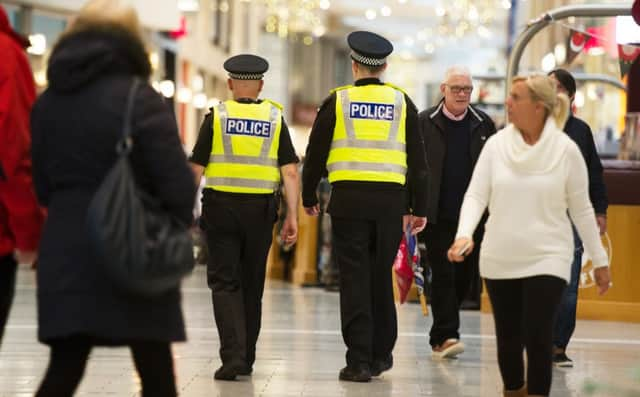Chris Marshall: There’s more to policing than figures


While it’s true that recorded crime is now at its lowest level since the early 1970s, it’s only the very naive or the very stupid who believe those statistics tell the whole story.
During a feisty First Minister’s Questions in Holyrood earlier this month, Nicola Sturgeon countered criticism of Police Scotland with the oft-repeated statistic about recorded crime.
Advertisement
Hide AdAdvertisement
Hide AdThe reaction from one of the country’s senior police officers was particularly telling.
Niven Rennie, president of the Association of Scottish Police Superintendents and a prolific tweeter, responded on Twitter: “Recorded crime may be at a low – actual crime isn’t.”
Mr Rennie’s point was that while Scotland’s streets may be safer – mirroring a trend across the western world – police are dealing with record levels of cybercrime and business fraud, much of which goes unreported.
He said Police Scotland was hamstrung by a 2007 SNP election pledge to have an extra 1,000 officers, something the ruling party continues to deliver.
Maintaining more than 17,000 officers means Police Scotland currently spends more than 92 per cent of its budget on staff costs, a position which Mr Rennie believes is untenable.
In a submission to the Scottish Parliament’s justice committee on the Scottish Government’s draft budget, he called for the restriction on officer numbers to be removed, warning that attempts to deliver traditional policing under the current financial constraints is a “recipe for disaster”.
As if these warnings weren’t dire enough, a statement released yesterday by the Scottish Police Federation said Scotland is “woefully under-equipped, under-resourced and under prepared” for a terrorist attack such as the one on the streets of Paris earlier this month.
The SPF, which represents 98 per cent of rank and file officers, said: “Whilst overall the police service in Scotland is in much better shape and health than the police service across England and Wales, it is time governments of whatever colour grasped the nettle of making sure they provide the resources to deliver on their first duty; keeping citizens safe. Soundbites, plaudits and selective use of questionable statistics come nowhere near to hitting that bar.”
Advertisement
Hide AdAdvertisement
Hide AdThe SPF called for more trained officers to routinely carry their weapons in public to help counter the terror threat.
Agreeing to that would be a knee-jerk reaction to the Paris attacks following the debate over armed policing that was had in Scotland last year.
But it’s clear that Police Scotland needs to be handed more autonomy over its own affairs if it is to balance the books, while managing to achieve its stated aim of “Keeping People Safe”.
Allowing the force to decide officer numbers would be a good place to start.
As with recorded crime being at a 40-year low, a numerical target for the number of officers is absolutely meaningless.
Worse still, the financial implications of maintaining that target appear to be damaging the service’s ability to deliver.
Next month will see the start of a new era in Scottish policing when Chief Constable Sir Stephen House stands down and his successor is appointed.
The new man, whoever he may be, will have a huge job on his hands, with many tough times ahead – not least a projected overspend of at least £25 million this year.
Giving him control over officer numbers would be one way to lessen the burden.